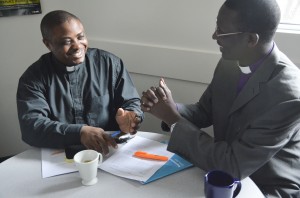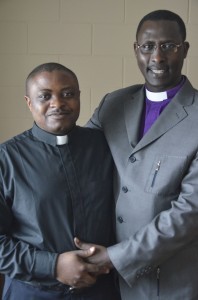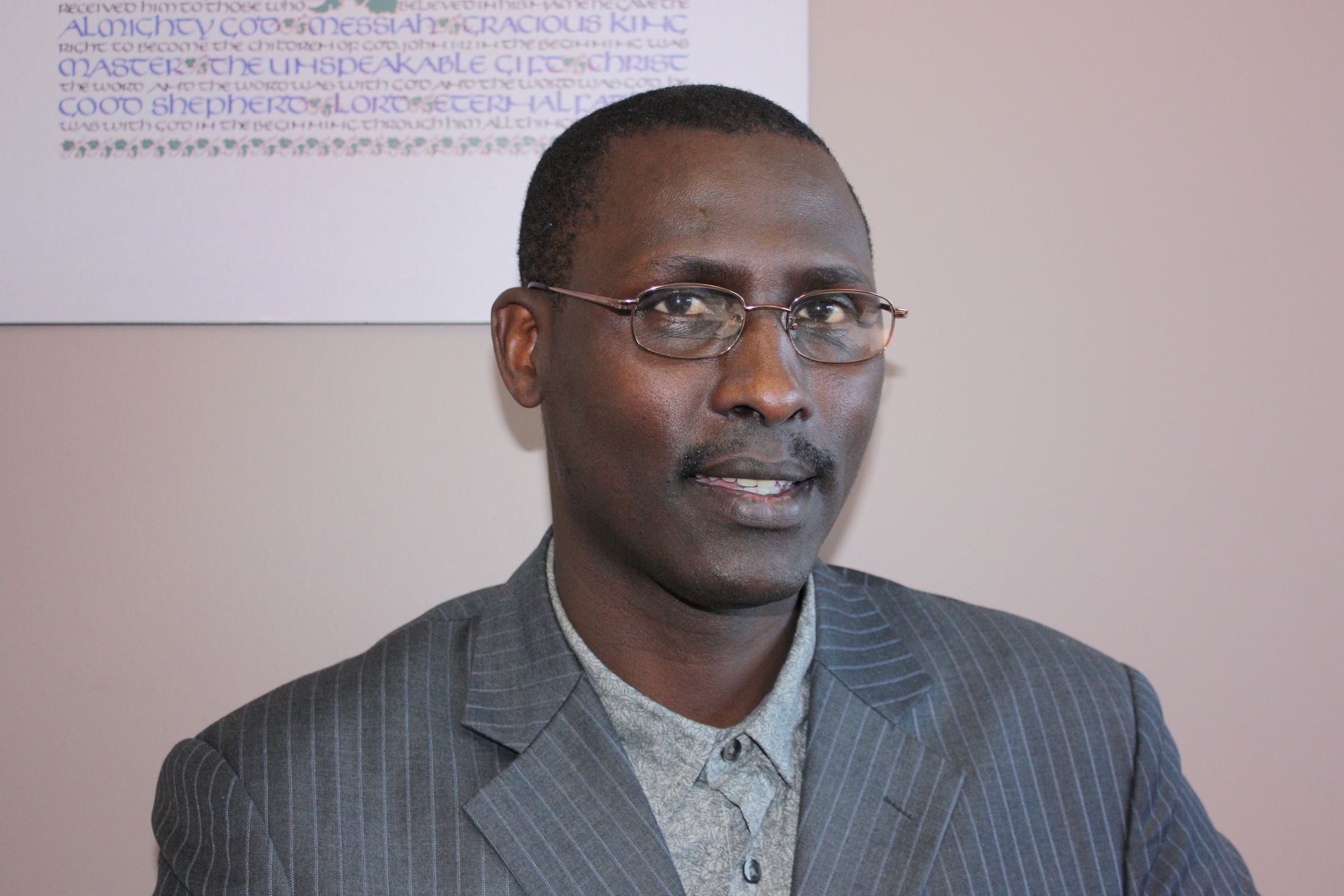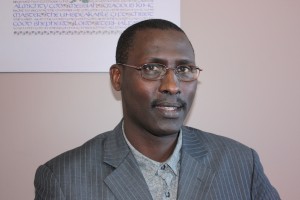Studies at CMU inspire Congolese pastors to work toward reconciliation
If they weren’t studying together at Canadian Mennonite University in Winnipeg, Theo Muthumwa and Shadrack Mutabazi would be adversaries.
The local pastors are from the Democratic Republic of Congo. They survived ethnic violence and traumatic civil war in their homeland, years of exile elsewhere in the region, and arriving in Canada as immigrants. Both study Peace and Conflict Transformation Studies (PACTS) at CMU.
While they have much in common, Muthumwa is part of the Bantu majority from the eastern Congo, while Mutabazi is from the Banyamulenge minority. The differing peoples have a history of mistrust and war against one another.
Today, the two are working toward peace and reconciliation between their peoples.

Their paths first crossed during an introductory PACTS course at CMU. Through periodic classroom discussions, their ethnic identities were revealed to each other, and with every in-class encounter they shared more stories, becoming close friends in the process.
“We are now telling (our) stories,” Muthumwa says. “If we didn’t talk, we would finish at CMU and I would think (Mutabazi) is my enemy.”
“We believe that leaders are servants of God who can be ambassadors of reconciliation to bring people together … and yet some of our colleagues are preaching the gospel of division,” Mutabazi adds.
Muthumwa says the two have a mission to promote peace and reconciliation because the Bible instructs them to do so in Matthew 9.
“It’s also the mission of CMU,” he says. “It has shaped us.”
Both came to CMU to study Theology, but they found PACTS inspiring.
Ultimately, it’s equipping them to work toward peace and reconciliation between their peoples.
“Banyamulenge in eastern Congo have a reputation of being people who bring trouble,” says Muthumwa, who is a Bantu. He has faced persecution, attempted murder, and ultimately exile for denouncing Congolese marginalization of the Banyamulenge, and for vocally renouncing his own people’s violence and hatred toward them.
As a Banyamulenge, Mutabazi has lost loved ones to horrific violence. After fleeing war-torn East Congo, he lived in exile in Rwanda for 10 years and in Uganda for five.
“I lost both my parents in the war,” he says. “We have wounds in our hearts because of the war.”
After arriving in Canada as immigrants in the late 2000s, both felt unable to speak about their past and who they are, even as they read about events in the Congo and saw images of their homeland.
“So many Canadians don’t know our struggle,” Muthumwa says.
As ministers, both have planted churches while in the Congo, while in exile, and now in Canada as well.
In Winnipeg, Mutabazi started Shalom Christian Outreach and Muthumwa founded Philadelphia Miracle, both congregations serving Africans, immigrants, and Canadian citizens.
They believe that telling their story is crucial to finding unity and forgiveness.
That doesn’t make it easy, though. Mutabazi recalls the time he stopped attending classes for a week after hearing a lecturer’s stories of ethnic genocide, which triggered his own memories of violence and left him in shock.
“These are deep, deep wounds,” Mutabazi says, emphasizing that facing the future requires truly understanding the past.
 “CMU is helping us to speak of where we have come from, where we are now – digging for knowledge and learning – and planning now for our future to go and meet survivors and help bring them together for reconciliation.”
“CMU is helping us to speak of where we have come from, where we are now – digging for knowledge and learning – and planning now for our future to go and meet survivors and help bring them together for reconciliation.”
Bringing unity to their people is a difficult process, but Mutabazi and Muthumwa have watched young people create space through music.
Mutabazi’s children joined other Congolese congregations to form a band that now regularly plays at Congolese church services and events across the city, bringing together communities that otherwise have little contact.
“(In Congo), people are using the youth for fighting. Let us use our youth and our leaders to have a dialogue,” Mutabazi says.
After seeing the potential significance of their work for the greater African community, Mutabazi and Muthumwa started Reconciliation Initiatives and Healing for African People.
“Our goal is not to end here, it is to also go back home. We have so many spiritual leaders not aware of peace,” Muthumwa says. “The studies we got from CMU are a bridge. We want to start first with those Congolese here, to create a sense of dialogue, and to create also dialogue in Africa.”
They also look with hope to the greater Winnipeg community.
“Most people here, we’ve found, are listeners – they want to listen to our stories, but we want them to go to the next step,” Muthumwa explains.
“Your grandparents came to Canada and they struggled. We are also facing these kinds of struggles – being in a new place, no family, no one to show you what to do. It’s not easy for us. We need people to welcome us.”
Photos and story by Matthew Veith (CMU ’13)


